

Futurist 40 Years Later: Possibilities, Not Predictions. Ability to Learn Is Affected by the Timing of Sleep: Scientific American Podcast. Sleep has many functions—including facilitating learning. Now a study finds that when we acquire new information, and how soon we sleep after that may affect our retention of the info. That’s according to research in the journal Public Library of Science One. Scientists had more than 200 subjects memorize related words like “fire and smoke,” or unrelated word pairs like “insect and truth. " Some studied the words at 9 A.M., others at 9 P.M. The researchers tested the subjects’ ability to remember the pairs after 30 minutes, 12 hours or 24 hours. Sleep had little effect on the ability to recall related words. Here is the most interesting finding: In the 24-hour retest—where all subjects had a full night of sleep—those participants who went to bed shortly after learning the words did much better than those who went through an entire day before sleeping.
Introducing The Curator's Code, 10 things no one tells you about creativity, the "fourth culture," and more. Hey there!
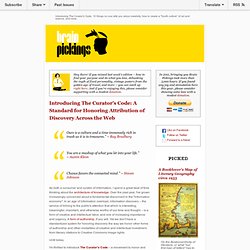
Places we don’t want to go: Sherry Turkle at TED2012. Front foot consulting. Ask strangers in your office lift, a business prospect, your clients, agencies, suppliers, even your close circle of friends & family (who may not even be in Google+ yet) the question, “how are you?”
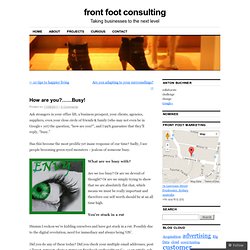
The Innovator's Perspective. Do Your People Trust You? - Linda Hill & Kent Lineback. By Linda Hill & Kent Lineback | 11:33 AM March 2, 2012 When we talk to managers, we often ask, “Do your people trust you?”

Most are taken aback. It’s not something they’re often asked or a question they’ve even asked themselves. Is Social Media Actually Making Us Less Connected? How your brain works - at work. The-demand-for-curiosity-creativity-and-innovation from innovationexcellence.com. Curiosity, Creativity and Innovation have become sexy topics in the business community, business schools and the business press over the past decade.
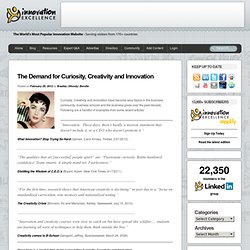
Following are a handful of examples from some recent articles: “Innovation. A Precious Hour — some good advice for the creative-minded. Be Square: Social Squared, That Is. At the Stanford Center for Social Innovation, we just concluded a conference with the State Department in preparation for the upcoming Rio 2.0 conference (Rio+2.0: Bridging Connection Technologies and Sustainable Development).

The focus of the conference was on the role of technology/connectivity to drive social change. As I was listening to the panels surrounded by global social innovators, the multiple meaning of the word “social” struck me. 5 Ways To Do Good In Any Job. The Secrets of Successful WordPress Sites with Joost de Valk. New video: TeleMedia Futures presentation at Total Telecom 2011 (London) Quick Blogging Tips For Newbie Bloggers - Successful Blogging Advice. Successful Blogging For Newbie Bloggers Blogging tips are a dime a dozen these days, but there are plenty of basic and hot ideas that get overlooked by newbie and, sometimes, even experienced bloggers.
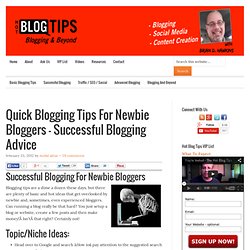
Can running a blog really be that hard? You just setup a blog or website, create a few posts and then make money! Start Making. Start Making. Recruiting: 8 Qualities Your Best Employees Should Have. Great employees are reliable, dependable, proactive, diligent, great leaders and great followers... they possess a wide range of easily-defined—but hard to find—qualities.

A few hit the next level. Some employees are remarkable, possessing qualities that may not appear on performance appraisals but nonetheless make a major impact on performance. Schumpeter: Enterprising oldies. The Social Media Maven Daily. TED's Founder on Reinventing the Conference : Innovation Re-inventing the Conference. Katie Morell chats with Richard Saul Wurman about his view of innovation and entrepreneurship.
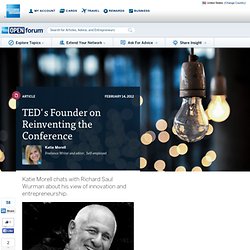
February 14, 2012 It’s early one morning in mid-January when I call up Richard Saul Wurman, founder of TED Conferences. I’m looking forward to chatting with him about how he launched his internationally known conference business, but instead I learn much more about his definition of innovation, his bottomless well of ideas and his view of entrepreneurship. Twitter Co-Founder Says it is Unhealthy to Stare at Twitter for Hours. Biz Stone, co-founder of Twitter, ironically told attendees at a conference this week that users should be careful not to spend hours on the social media site because it’s “unhealthy”.
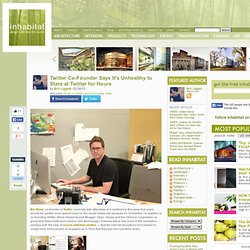
In addition to co-founding Twitter, Stone helped launch Blogger, Odeo, Xanga and the Obvious Corporation (a group that helps build and invest in new technology). It seems Stone has come to the realization — perhaps with the help of recent addiction studies — that the internet sensations he’s helped to create have some people so wrapped up in them that they just can’t put them down. Stone is currently the creative director at Twitter and though he said, “Obviously, we want you to come frequently,” he seemed a tad disturbed by the long hours some Twitter users spend on the site. Some studies say that there will be 21 million Twitter users in the US alone by the end of this year — that’s just a part of the 100 million active users worldwide.
Via The Guardian UK Lead image by Mohamedn on Flickr. Disconnect Revolution.